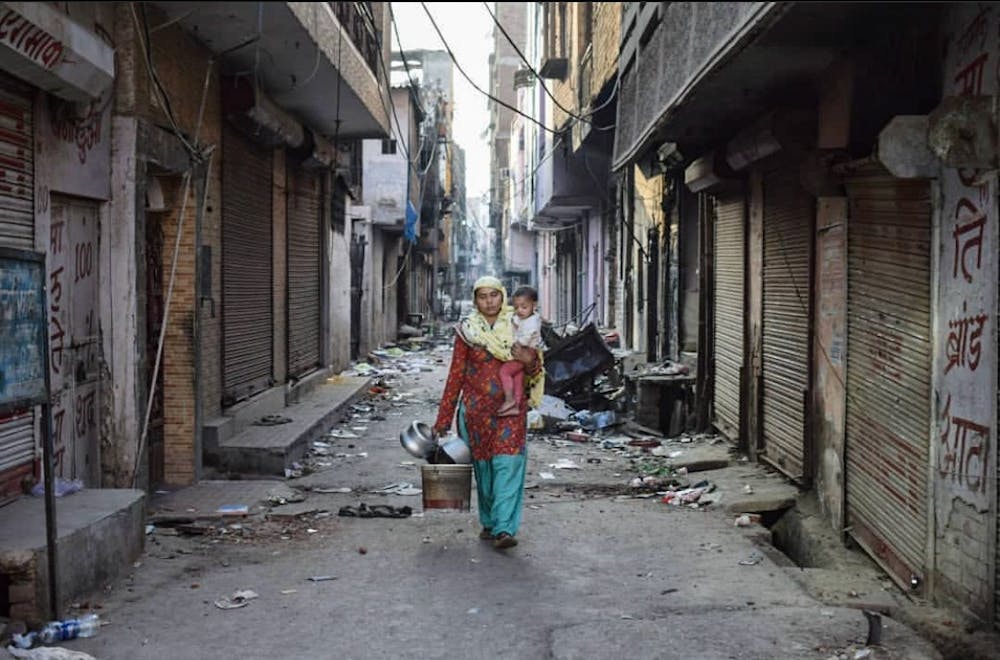Salaah Khan says she feels sick and helpless watching the news about her home country, India. She says she is horrified by the lynch mobs, the burning neighborhoods and the religious intolerance that have spread across the country in recent weeks. In the country’s capital of Delhi, at least 53 people, mostly Muslim, were killed and 200 were injured during street riots initiated by Hindu nationalist mobs.
“It makes me cry and makes me sad,” the senior business major from Bombay said. “And what hurts the most is that I’m here and there’s nothing I can do except spread awareness [and] post [on social media].”
The riots and attacks began after Kapil Mishra, a leader of India’s ruling party, threatened peaceful protestors of the recently passed citizenship law. The law excludes Muslims from obtaining citizenship quickly and creates a new Citizenship Amendment Act and National Register of Citizens, which many insist is unconstitutional and violates India’s secularism. Thousands took to the streets to protest these new laws. India has roughly 200 million Muslims, which account for about 15% of the population.
Shantam Goyal, an English Ph.D. student from Delhi, said it has been disheartening to watch police “doing nothing” to control the violence.
“Suddenly, being openly racist is acceptable,” he said.
Goyal and Khan are just a fraction of UB’s 1,860-student Indian community, many of whom are terrified to see the democratic, multi-ethnic nation in its current state. Since they’ve been at UB this year, they’ve heard about the arrests of activists and the silencing of journalists trying to cover the increasingly Hindu nationalist government. They are afraid the country they left to come to UB has changed.
Goyal feels hopeless about India’s future. He says “it doesn’t really matter what is written in the constitution anymore,” and “the right to protest has been shrinking and shrinking in Delhi.”
Despite their worries, they don’t agree on what should be done to stop the violence. Some support Indian Prime Minister Narendra Modi and his policies. They believe the citizenship law and the NRC are beneficial to the country.
Yash Lapsiwala, a junior business administration major from India, supports the citizenship law and NRC and says the policies are good for the country and its citizens. He feels the law isn’t “totally” anti-Muslim and that people should educate themselves more.
“People are getting hyped for no reason. If they have proof [of citizenship] they don’t need to worry,” Lapsiwala said. “… People should be provided more knowledge regarding the bill.”
He condemned the violent attacks on protestors and said both communities suffered from the riots.
Khan said she feels safer at UB than she would in India, but she’s worried for her family back home.
“It only takes one small thing for [riots] to transfer to Bombay, so I’m definitely scared for my family, because [they are] all Muslims,” Khan said.
After three days of violence from Feb. 23 - 26, Modi called for “peace and calm to be restored.” Modi welcomed President Donald Trump on Feb. 25 and rolled out cultural events and receptions as the riots occurred.
Shaanta Murshid, a social work professor, avidly follows Indian news as her research is focused on diversity, political violence, oppression and its outcomes. She said Modi’s silence makes him “complicit” to the violence.
“[Modi] and his government and the Hindu nationalists have criminalized the Muslims for exercising their democratic rights,” Murshid said.
Hindus and Muslims have a history of conflict and being divided for political agendas, which eventually led to the 1947 partition of India and Pakistan. Many Muslims flocked to Pakistan, which became a Muslim state, but millions remained in secular India.
“By constitution, we’re a secular country and we’re all equally a part of it,” Khan, said. “My ancestors decided to stay in India and not move to Pakistan. It’s like people are trying to prove the point that whoever moved to Pakistan made the right decision. … India is my country and not Pakistan, so that’s what hurts.”
Khan said Modi introduced the citizenship act “out of nowhere” and it “doesn’t make sense.”
“[Modi] spent so much money behind the CAA that if he’d put the same amount of money to feed poor people, there [would] probably be a lot of people with food on their plates,” Khan said. “… Everything is so expensive but we’re spending so much money on things that don’t make sense in an economy that’s not booming.”
Anupriya Pandey, an Asian studies professor from India, said the situation has been “emotionally triggering,” because it has caused her to have disagreements with her family. Some of her friends and family agree with Modi’s policies and “refuse” to see a different side, making it “difficult for her to have a voice in the family,” she says.
“I’m having to redefine my own relationships with my family because most of them come with this idea of Hindus [are in danger],” Pandey said.
Netra Mittal, a sophomore economics and math major, said she was frustrated with the divide within the Indian community. She said her peers who support Modi are coming from “a place of privilege,” calling the support a combination of “ignorance and denial.”
Khan said she hopes people can unite and fight for a better future.
“I just hope this brings Indians together and makes them realize that we’re in this together, that we’re not separate people and we’re done fighting each other,” Khan said. “And we should fight for a better government, a better leadership.”
Vindhya Burugupalli is a senior multimedia editor and can be reached at vindhya.burugupalli@ubspectrum.com and @moonhorizon_.

Vindhya Burugupalli is the engagement editor for The Spectrum. She loves traveling and documenting her experiences through mp4s and jpegs. In her free time, she can be found exploring cute coffee shops and food spots.





